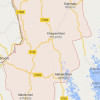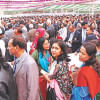How included do indigenous students feel in their universities?

Last year proved delightful with a generous ten-day respite for Eid-ul-Fitr and an indulgent month-long vacation for Eid-ul-Adha, courtesy of a well-planned semester break. As the week preceding Eid or Puja vacation approached, my thoughts were in a whirl, eagerly anticipating the imminent arrival of holiday joy spent amidst loved ones. The promise of these longer moments with family and celebration became a source of excitement in the days leading up to the cherished holidays.
However, while I loved my Eid vacations as a child, I often wondered how my indigenous friends felt about the bigger picture. Do they feel a part of the institution where they spend most of their days?
Indigenous festivals often receive minimal acknowledgement, with only a one-day holiday granted for major celebrations. Hritu Roy, a fourth-year student majoring in International Relations at Dhaka University, says, "As an indigenous student, the most discrimination I face in school, college, and even university life is not getting any official holidays to celebrate our major cultural festivals. The university authorities have not taken any action in this regard so far. Every year, indigenous students protest but to no avail. It can be seen that academic activities continue in the department during the festival."
Other indigenous students share the same sentiment. Khingmokay Marma, majoring in Mass Communication and Journalism at Dhaka University, states, "After getting into university, there hasn't been a single time where I was able to celebrate our cultural festivities. I had to miss classes to celebrate with my family. Sometimes there are exams which make it impossible to visit my hometown during the special festivities. It stings that my friends could celebrate Eid and Puja with their loved ones but I couldn't be a part of our cultural festivities with mine."
Apart from being deprived of adequate holidays for religious and cultural celebrations, indigenous students frequently express deep dissatisfaction with the ongoing harassment they face in educational institutions, which stems from preconceptions founded on their cultural origin. This unfair scrutiny based on their cultural background greatly exacerbates the difficulties they face when adapting to academic contexts. The widespread discrimination they endure casts a problem over their educational journey, hampering their efforts to integrate seamlessly and feel a sense of belonging.
This is a common complaint of first-year students upon their arrival at university. Aungho Khumi, a student of Mathematics at Jahangirnagar University, says, "It was challenging at first since I couldn't socialise with everyone and I was anxious about everything. I also needed some time to adjust to the university's environment and culture. It was difficult to adjust to diverse types of seniors and friends. The majority of friendly seniors were excellent, but there were some friends with negative mentalities, seniors as well, because of which we had to go into adverse situations at times. At first, I felt a little lonely because of them, and that is why indigenous students feel comfortable being together."
Khingmokay Marma spoke of when she first got admitted and had to answer uncomfortable questions from her peers. However, her classmates tried to remain friendly so she hardly felt like an outsider. She went on to say that if it weren't for the pandemic, she would have blended in more.
The interviewees made sure to point out that they are now well-integrated despite the troubles that they deal with.
By including culturally sensitive curricula that represent varied perspectives and histories, universities can promote a greater understanding of indigenous students. This entails actively involving indigenous people in the educational process, supporting indigenous-led initiatives, and giving resources for cultural awareness programs.
Creating safe spaces that honour indigenous traditions and knowledge, as well as establishing mentorship programs, all contribute considerably to developing an inclusive environment. Furthermore, prioritising continuing communication, observing indigenous norms, and amplifying indigenous voices in academic discourse are critical steps toward establishing a more comprehensive knowledge and support system for indigenous students in university settings.
Every university across the nation is a melting pot of students from diverse ethnic backgrounds. It's crucial that every student, irrespective of ethnicity, feels equally valued and included. Being part of a minority group should not mean receiving any less than what the majority does. Universities need to step up their game to ensure this inclusivity.
Azra Humayra is currently majoring in Mass Communication and Journalism at Dhaka University.

 For all latest news, follow The Daily Star's Google News channel.
For all latest news, follow The Daily Star's Google News channel. 








Comments